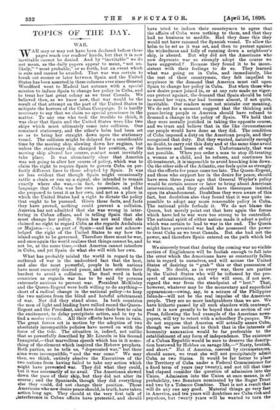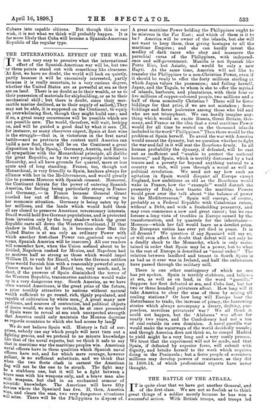TOPICS OF THE DAY.
WAR.
WAR may or may not have been declared before these pages reach our readers' hands, but that it is now inevitable cannot be denied. And by "inevitable" we do not mean, as the daily papers appear to mean, "not un- likely," "most probable," or so forth, but an event which is sure and cannot be avoided. That war was certain to break out sooner or later between Spain and the United States has been asserted in these columns ever since General Woodford went to Madrid last autumn with a special mission to induce Spain to change her policy in Cuba, and to treat her last great colony as we treat Canada- We believed then, as we know now, that war would be the result of that attempt on the part of the United States to mitigate the horrors of the Cuban Campaign. It is hardly necessary to say that we claim no special prescience in the matter. To any one who took the trouble to think, it was clear that Spain and the United States were like two ships which must ultimately come into collision. One remained stationary, and the other's helm had been set so as to bring her straight down upon the stationary vessel. The collision might be delayed for a considerable time by the moving ship slowing down her engines, but unless the stationary ship changed her position, or the moving ship altered her course, contact must inevitably take place. It was abundantly clear that America was not going to alter her course of policy, which was to claim the right to require Spain to govern Cuba on per- fectly different lines to those adopted by Spain. It was no less evident that though Spain might occasionally rattle a chain or run up a signal, she intended to remain exactly where she was,—in fact, to declare in polite language that Cuba was her own possession, and that she proposed to treat it as her own, and not as a place in which the United States had a right to dictate the policy that ought to be pursued. Given these facts, and facts they have proved, nothing could prevent a collision. America has not admitted that she was wrong in inter- fering in Cuban affairs, and in telling Spain that she must change her policy. Spain has not said that she claimed no right to regard Cuba as she regards Andalusia. or Majorca—i.e., as part of Spain—and has not acknow- ledged the right of the United States to say how the island ought to be governed. Therefore there must be war, and once again the world realises that things cannot be, and not be, at the same time.—that America cannot interfere in Cuba, and yet Spain do what she will with her own.
What has probably misled the world in regard to the outbreak of war is the undoubted fact that the best, and also the most powerful, people in both nations have most earnestly desired peace, and have striven their hardest to avoid a collision. The final word in both countries as regards war has to be said by persons extremely anxious to prevent war. President McKinley and the Queen-Regent were both willing to do anything— short of a radical change in the national policy—to keep the two nations from the blind and hateful arbitrament of war. Nor did they stand alone. In both countries the men of light and leading have rallied round the Queen- Regent and the President, and have done their best to calm the excitement, to delay precipitate action, and to try to find a modus vivendi. All their efforts have been in vain. The great forces set in motion by the adoption of two absolutely incompatible policies have moved on with the force of the tide. The situation is, indeed, not unlike that so powerfully described by Mr. Lincoln in his Second Inaugural,—that marvellous speech which has in it some- thing of the element which inspired the Hebrew prophets. Both parties, as he tells us, " deprecated war," but their aims were incompatible, "and the war came." We may then, we think, entirely absolve the Executives of the two nations from having failed to take any action which might have prevented war. They did what they could, but it was necessarily of no avail. The Americans slowed down the pace of their ship, but they did not alter its course ; and the Spaniards, though they did everything else they could, did not change their position. Those Americans who now desire peace should,in truth, have taken action long ago. They should at the very first talk of .interference in Cuban affairs have protested, and should have tried to induce their countrymen to agree that the affairs of Cuba were nothing to them, and that they had no business to meddle. Had they done this they would not have rammed the Spanish vessel. To allow the helm to be set as it was set, and then to protest against the wickedness and folly of running down a neighbour's ship, is absurd. But why did not the Americans who now deprecate war so strongly adopt the course we have suggested ? Because they found it to be incon- sistent with their feelings to do so. They learned what was going on in Cuba, and immediately, like the rest of their countrymen, they felt impelled to acquiesce in the demand that America must call upon Spain to change her policy in Cuba. But when those who now desire peace joined in, or at any rate made no vigor- ous protest against, the demand that Spain should be told to mend her ways, war had become almost, if not quite, inevitable. Our readers must not mistake our meaning. We do not for a moment suggest that the thinking and peace-loving people in America should have refused to demand a change in the policy of Spain. We hold that they were morally justified in taking the opposite course, and we trust and believe that in the like circumstances our people would have done as they did. The condition of Cuba imposed a duty on the American people, and they recognised that duty. But they wanted, naturally enough no doubt, to carry out this duty and at the same time avoid the horrors and losses of war. Unfortunately, that was not possible. When you order a man to stop ill-treating a woman or a child, and he refuses, and continues his ill-treatment, it is impossible to avoid knocking him down. On the other side of the Atlantic, one feels quite as strongly that the efforts for peace came too late. The Queen-Regent, and those who support her in the desire for peace, should have seen three years ago that General Weyler's policy would be certain sooner or later to bring about American intervention, and they should have thereupon insisted upon its abandonment. Doubtless they were aware of this fact, but doubtless also they found that it was quite im- possible to adopt any more reasonable policy in Cuba. The national pride forbade it. We do not blame the Queen, but merely point out that here again the forces which have led to war were too strong to be controlled. The national spirit of either nation made it adopt a policy which was certain to lead to war in the end. The Queen might have prevented war had she possessed the power to treat Cuba as we treat Canada. But she had not the power, and therefore Spain entered on the path which led to war.
We sincerely trust that during the coming war no visible section of Englishmen will be foolish enough to fall into the error which the Americans have so constantly fallen into in regard to ourselves, and will accuse the United States of desiring to " grab " this or that possession of Spain. No doubt, as in every war, there are parties in the United States who will be inflamed by the pro- spect of annexations, and who will soon, if not now, regard the war from the standpoint of " loot." That, however, whatever may be the momentary and superficial appearances—owing, say, to a, seizure of the Philippine Islands—will not be the real impulse of the American people. They are no more landgrabbers than we are. We have hitherto passed by all such slanders with contempt, and it is now greatly to be hoped that no section of our Press, following the bad example of the American news- papers, will try to retort with a schoolboy Tu quoque. We do not suppose that America will actually annex Cuba, though we are inclined to think that in the interests of humanity annexation would be far preferable to the establishment of any form of independence. The existence of a Cuban Republic would be sure to deserve the descrip- tion bestowed by Hobbes on savage life,—" Nasty, brutish, and short." But if America, coerced by circumstances, should annex, we trust she will not precipitately admit Cuba as two States. It would be far better to place the Territory of Cuba under a Federal Commissioner for a fixed term of years (say twenty), and not till that time had elapsed consider the question of admission into the Union. Admission into the Union at once means, in all probability, two Senators nominated by the Sugar Trust and two by a Tobacco Combine. That is not a result that will do any one any good. Material things go very fast in America, and ten years will doubtless see Cuba rich and populous, but twenty years will be wanted to turn the Cubans into capable citizens. But though this is our wish, it is not what we think will probably happen. It is far more likely that Cuba will become a Spanish-American Republic of the regular type.



































 Previous page
Previous page